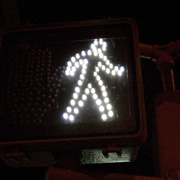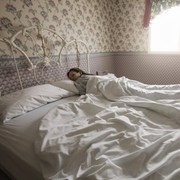Nearly one in three Americans may experience an episode of sleepwalking in their lives, according to a new study. The study also found that 3.6 percent of people sleepwalk regularly – much higher than the .04 percent of people in the population who suffer from narcolepsy.
“Put into perspective, 8.5 million people are concerned [who frequently sleepwalk],” said study author Dr. Maurice Ohayon with Stanford University in Palo Alto, Calif. “The problem is not so much with the rare cases. There are a huge number of people who have had regular, frequent sleepwalking during the past year.”
The researchers defined regularly sleepwalking as more than two episodes per month, Ohayon clarified. The study, which involved more than 15,000 participants in multiple states, is the first to track sleepwalking rates on a national level.
People who suffered from mental disorders such as depression and obsessive-compulsive disorder (OCD) were especially prone to sleepwalking.
People with depression were 3.5 times more likely to sleepwalk, while people with OCD were four times more likely. Those who took certain anti-depressants called SSRIs also appeared to have a higher risk of sleepwalking, but Ohayon said this was likely tied to the depression, rather than the treatment.
“Depression and OCD are often associated with sleep disorders,” Ohayon said. “You find disturbed sleep often with depression. With depression, there is more nocturnal awakening and more ruminating during the night, which in turn increases sleepwalking risk.”
Another sleep problem, sleep apnea, was also highly associated with sleepwalking – enough so that Ohayon recommended if one condition is present, a person’s physician should check for the other. The prevalence rates of the two conditions are nearly equal, according to Ohayon.
“Sleepwalking and sleep apnea are badly associated, which means when you identify sleepwalking you must look absolutely at the possibility of sleep apnea,” he said. “Sleep apnea has very bad consequences such as hypertension and less oxygen in the brain over a long period of time, which can cause a lot of problems in itself.”
Consequences of sleepwalking, however, are typically not as serious long-term, outside of confusion or disorientation waking up in the morning. Serious accidents can happen because the person has no control or awareness over his or her body, but these are few and far between, Ohayon said.
“In the majority of cases of sleepwalking you disturb your own environment or disturb your own life when you find your kitchen in a bad state, for example, and you don’t remember what happened,” he said. “However, sleepwalking can also multiply chances of having a bad accident, which is something preoccupying.”
While sleepwalking was more prevalent than younger age groups than older ones, there was no difference in the likelihood of sleepwalking between the genders. Additionally, pregnancy did not seem to be a risk factor.
Related Links:
Sleep apnea can raise risk of cancer, studies indicate
http://www.foxnews.com/health/2012/05/21/sleep-apnea-can-raise-risk-canc...
Kava: The anti-anxiety herb is making a comeback
http://www.foxnews.com/health/2012/05/15/kava-anti-anxiety-herb-is-makin...
Top 5 High-Energy Foods (almonds)
http://v8-pvw.foxnews.com/slideshow/health/2011/11/25/top-10-high-energy...
Read more: http://www.foxnews.com/health/2012/05/15/sleepwalking-rates-in-us-much-h...





Add a CommentComments
There are no comments yet. Be the first one and get the conversation started!